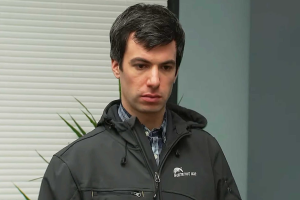For the last five months, I’ve been stepping into the shoes of a Jewish woman whose husband was lynched for a murder he did not commit.
Parade, a musical written and performed on Broadway in the late 1990s, tells the devastating and true story of Leo Frank, a Jewish New Yorker who lived and worked in Atlanta, Georgia in the early 1900s. In 1913, he was falsely accused of murdering 13-year-old Mary Phagan—a worker at the National Pencil Company where Frank was a supervisor. Since there was no evidence to support the claim that Frank committed the murder, his sentence was commuted from death to life imprisonment. However, he was later kidnapped from his cell and hanged by a mob. I play Lucille Frank—the woman who had to watch her innocent husband’s lynching.
In Parade, it is clear from the start that Leo embraces his Jewishness. He refuses to change any aspect of himself in order to fit in among the Southerners, using Yiddish words like “meshuggeneh” in the opening scene. Lucille keeps her Jewishness hidden and doesn’t understand why Leo uses Yiddish words.
When I perform this scene as Lucille, I can’t help but feel that she wants her family to live as “Jews of discretion,” an idea from the film Call Me By Your Name that replays in my head every time I step on stage.
Growing up in Thornhill, a heavily Jewish suburb just north of Toronto, I find myself relating to Leo. I went to Jewish schools and summer camps, and my family hasn’t missed a Shabbat dinner since I was born. In my family, the Jewish holidays are unfailingly a balagan—the Yiddish term for chaos. I have always welcomed this chaos, as this is a time for my family to celebrate our Jewish identity. I even found my way into the Jewish school system in my professional life, teaching high school drama. I wear my Jewishness proud.
These days, though, I find many in my community relating more closely to Lucille.
I’ve lived in downtown Toronto for over three years. I have seen countless protests, rallies, and politically motivated messages plastered around the city. These things never really phased me.
Over the last few weeks, however, these messages have shifted. I have seen swastikas, messages calling Jews “pigs,” and almost worst of all, images of Jewish kidnap victims being torn down.
One of my closest friends told me that she took her mezuzah down. Another told me she hides her Star of David necklace on the subway. In 2023.
These days, as much as I want to wear my Jewishness loud and proud, I catch myself feeling as though it’s safer to be like Lucille.
Since Oct. 7, I’ve felt a greater weight when working on Parade. I’ve been reminded of the consequences of complacency, and that antisemitism truly doesn’t care whether a Jew observes Shabbat or the High Holidays. A Jew is a Jew.
I am fortunate to have non-Jewish friends in my life who have reached out to me with care, particularly when there was a verbal threat of violence against the Jewish school where I teach.
I’ve also seen many non-Jews remain silent. I almost don’t blame them. For many, calling out antisemitism, it seems, is a controversial proclamation which excuses all the actions of the Israeli government.
In light of this, it often feels like Jews don’t count in mainstream activism. It’s hard for some people to see Jews as a marginalized group. The Holocaust occurred over 75 years ago, and many Jews have enjoyed exceptional success since then.
However, Leo Frank was lynched in 1915—24 years before the Jews faced a genocide that they still have not recovered from.
Leo Frank was lynched 108 years before I walked past a swastika on my way home in Toronto.
Parade is on stage Nov. 9-12 at NewRoads Centre for the Arts.
Jesse Levy is a teacher and actor based in Toronto.







